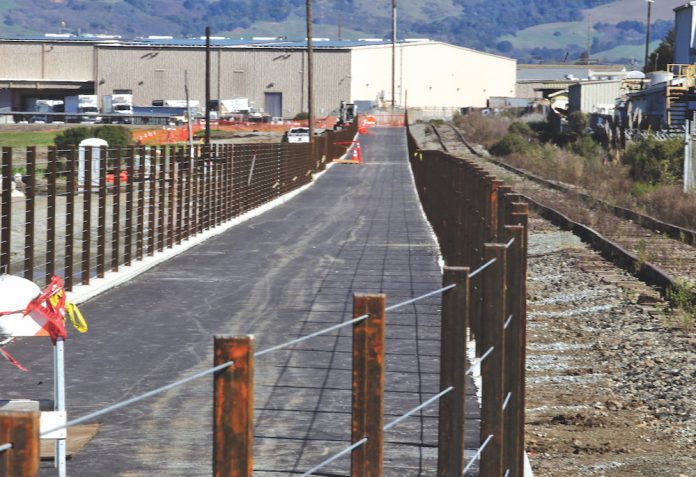SANTA CRUZ COUNTY—Hearing calls from fellow commissioners to take a “timeout” so that deep divisions between Santa Cruz County residents about the proposed 32-mile coastal rail trail can subside, a push during Thursday’s five-hour meeting to reconsider the Santa Cruz County Regional Transportation Commission’s (RTC) recent split vote on the passenger rail line business plan was shelved.
Brought forth by commissioner Eduardo Montesino, and seconded by commission alternate Felipe Hernandez, a motion asking RTC staff to bring the acceptance of the business plan back to the commission at a future meeting was briefly on the table. But, after hearing from other commissioners that the move would only further continue the contention that has arisen from the topic, Montesino removed the motion.
Montesino, who along with four other Watsonville City Council members at a special meeting on April 30 passed a resolution to urge the RTC to accept the business plan for construction and operation of a passenger rail line, said commission alternate Andy Schiffrin’s comments, in particular, influenced his decision.
Schiffrin said that another split vote would only drive people further apart. He said that he received several emails arguing for and against the rail, and “many of those people talked about the community agreeing with their perspective.”
“It really made me realize that we’re not really talking about a community when we’re talking about transportation, we’re talking about a bunch of communities,” he said.
The decision to pull the motion—and the vote from the April meeting—does not mean that plans to build a passenger rail system are dead, according to RTC Executive Director Guy Preston.
In a statement following a quick presentation from staff about the agency’s grant compliance related to the stalled business plan vote, Preston said that staff will continue to look for grant opportunities that would help fund the creation and operation of the passenger rail. If the agency does qualify for funding, staff would return to the commission for another possible vote to move forward on a needed $17.1 million environmental review.
Preston also said acceptance of the passenger rail business plan in April would not have meant, without question, that the project would come to fruition either.
“RTC has not turned down any funding that has been made available for a rail transit project in Santa Cruz County,” Preston said. “RTC staff is responsible for seeking funding for all RTC projects. I plan to continue to investigate the likelihood of any funding for any of our projects and advising the commission in seeking direction moving forward.”
The meeting was the latest chapter in the confusing countywide kerfuffle that, commissioners said Thursday, has been marred by personal attacks and misinformation campaigns from rail supporters and detractors.
The Zoom session was at capacity and at least two members of the public said that there were dozens of people left locked out from sharing their opinions on the subject. Those who did make it into the virtual meeting repeated much of what has already been said in the months leading up to Thursday. But there were callers in favor of passenger rail who said they only recently jumped into the fray, and several organizations and agencies have also recently voiced support for the project. That includes the Santa Cruz City Council, the Transportation Agency for Monterey County and several democratic clubs throughout the county.
Advocates envision a convenient, environmentally friendly transportation alternative that could connect the county and give daily commuters another resource. Opponents see an unsightly, expensive untenable behemoth incompatible with the county that is unlikely to reduce Highway 1 traffic congestion.
It is unclear when plans for the rail will return to the RTC.
“This, for me, is a timeout,” said commissioner Jacques Bertrand. “This gives us some time to think about what this whole project really means for the various elements in the Santa Cruz County community. What are their needs that may be or may not be met?”
The RTC’s plans for passenger rail are estimated between $465 million and $478 million. The 66-page business plan gave a 25-year outlook for the rail plan, including costs, which group had oversight and how much ridership was predicted once completed. It called for construction to commence around 2030, with rail service to begin five years later.
According to the plan, the project is short $189 million for construction costs and $125 million to run the rail system over the next two decades. The report listed numerous potential state and federal funding sources, but none of those are certain.








